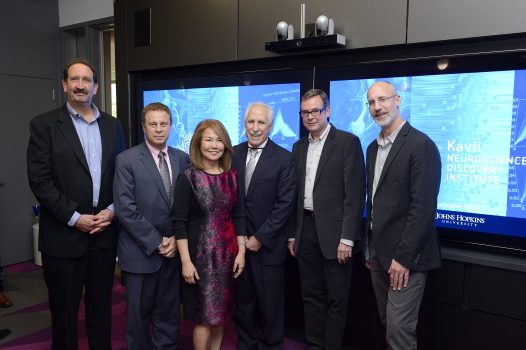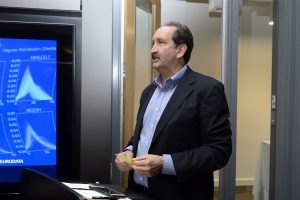To increase cross-disciplinary training, Kavli NDI recently awarded nine Distinguished Fellowships to support postdoctoral scientists whose work spans two or more distinct focus areas. Many of the funded projects would not have been possible without the opportunities for collaboration presented by Kavli NDI.
“We are bringing together neuroscientists and engineers to generate a new culture for investigating the brain,” said Richard Huganir, director of Kavli NDI. “This space will be a hub to increase interactions and communication and help create this new cross-disciplinary culture.”
The new space at the Homewood campus is one half of a bigger effort to promote communication and collaboration between Hopkins scientists. A similar space is being developed at the School of Medicine campus; once in place, a large live screen will link the two campuses around the clock to enable scientists to share data, collaborate, and brainstorm ideas from across the city in real time.
Attendees of the event were able to browse the new Clark Hall space during a poster session that displayed some of the research projects being conducted within Kavli NDI. The main room features a video teleconference system with two large screens that will connect students and faculty with Kavli NDI members located at the East Baltimore campus. Two neighboring side rooms contain numerous whiteboards, comfortable chairs, and tables that fit together like a puzzle to accommodate any number of teammates. The openness of the space is fitting for an institute that is eliminating the boundaries from science.
The event also included remarks from Paul Rothman, dean of the Johns Hopkins School of Medicine, and Ed Schlesinger, dean of the Whiting School of Engineering. Miyoung Chun, executive vice president of science programs at the Kavli Foundation, spoke to attendees about the promising future of brain research in the nation and at Johns Hopkins.
As Natasha Hussain, scientific director of Kavli NDI explained, “By uniting the scientific enterprise across Johns Hopkins University to study the brain, we are laying a foundation for the Kavli NDI to establish the global standard for integrative neuroscience research and understanding brain function.”


